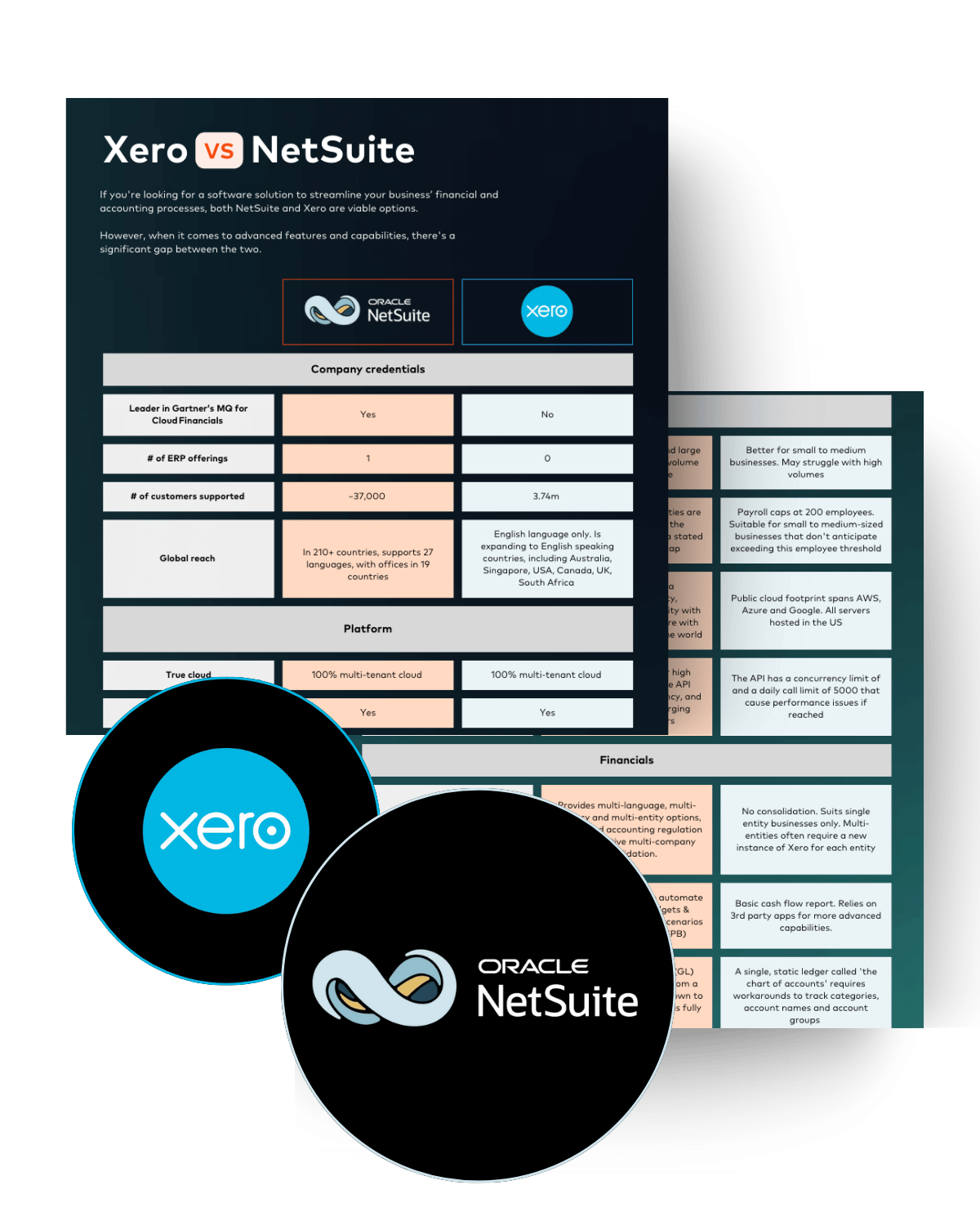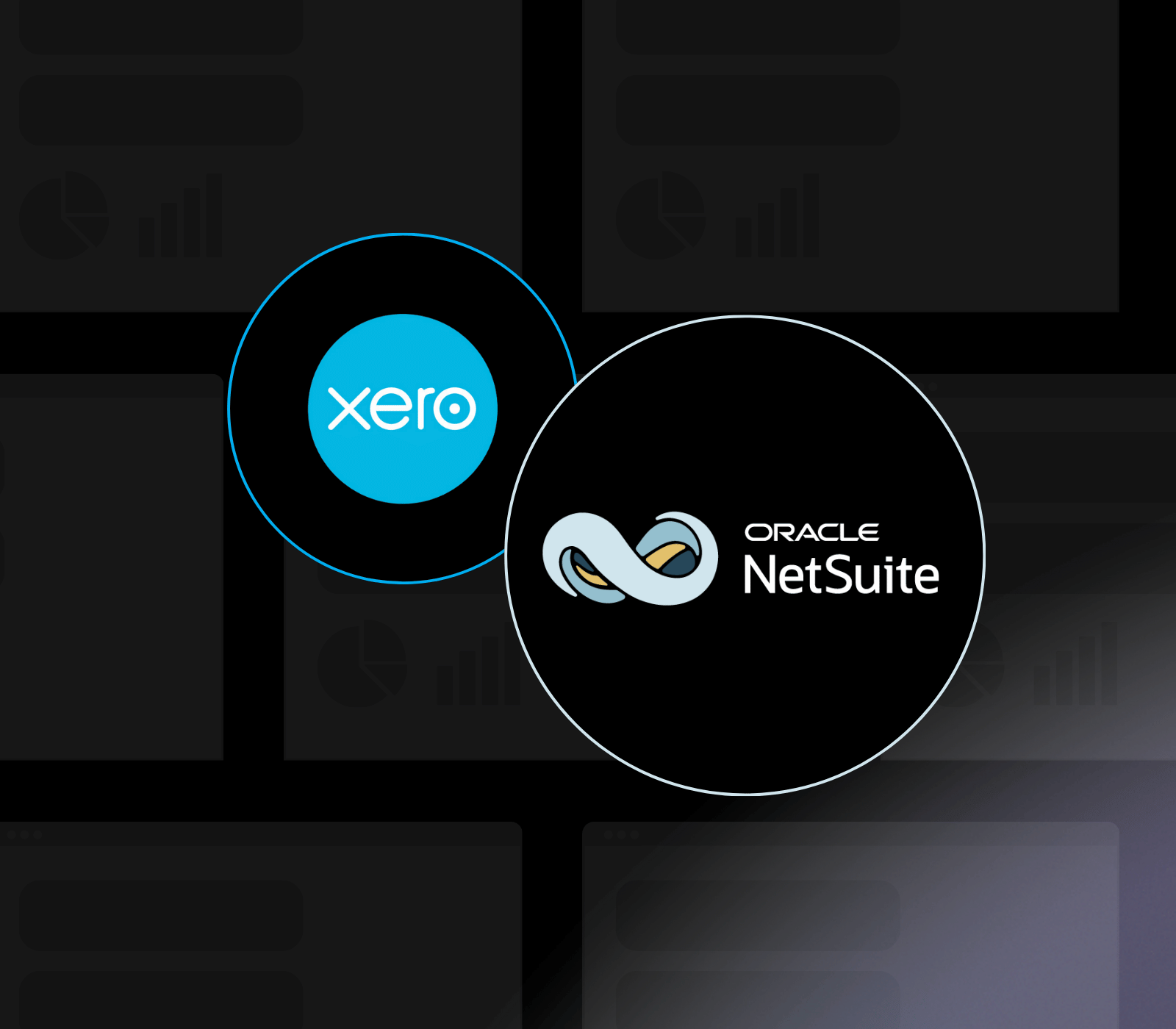Built for complexity. Trusted for scale.
-
Consolidate without compromise
NetSuite brings financials, intercompany transactions and multi-entity reporting into a single environment, without sacrificing local nuance or global oversight.
-
Reduce risk from disconnected tools
Unify critical functions like finance, approvals and inventory into one system, reducing manual work, spreadsheet dependencies and data blind spots.
-
Strengthen reporting and control
Move beyond retrospective reporting. With NetSuite, finance teams gain real-time visibility across cash flow, margin, performance and pipeline – so strategy, data and execution stay aligned.
Understanding NetSuite vs Xero
-
See NetSuite ERP in action
There’s no better way to explore how NetSuite ERP can benefit your organisation than by experiencing it firsthand.Request a product tour

Free infographic
Infographic: Comparing NetSuite and Xero
Download our feature-by-feature comparison infographic to see how NetSuite outperforms Xero for complex business needs.
Questions to ask before you choose
Xero is designed for single-entity operations and doesn’t natively support multi-entity, multi-currency or consolidated reporting. NetSuite is built for more complex structures with global tax compliance, intercompany management and real-time consolidation.
Xero works well for smaller businesses with straightforward needs. As operations grow, businesses often hit limitations around automation, reporting and scalability. NetSuite is designed to scale with you, from small teams to large, distributed organisations.
Xero offers limited workflow configuration. NetSuite gives you native tools to build automated workflows, multi-step approvals and role-based processes without external plugins or middleware.
Xero’s reporting covers basic financials but lacks advanced forecasting or planning. NetSuite offers real-time reporting, saved searches, dashboards and built-in analytics – plus advanced planning with modules like NSPB.
Xero relies on third-party apps for most extended functionality, which can lead to disjointed workflows. NetSuite has native modules across finance, inventory, CRM and planning, with direct integration options and a consistent data model.
Annexa runs a tailored implementation process based on your structure, data and growth goals. This typically includes detailed planning, system design, data extraction and transformation, configuration of NetSuite to suit your structure and onboarding support to ensure teams can hit the ground running.
Make finance your growth engine with NetSuite
-
An infrastructure that scales
Support growth with systems that evolve with your structure – whether that means new entities, global expansion or increased operational complexity.
-
Strengthen the link between data & direction
Give your team accurate, timely insights that inform strategic decisions – from investment timing to resource allocation.
Frequently asked questions about NetSuite
Yes. NetSuite’s OneWorld architecture allows you to manage multiple companies, currencies, languages, and tax rules in one consolidated platform. That means you no longer need to switch between files or duplicate data entry.
Not at all. NetSuite is ideal for mid sized business and scales to fit your needs. Annexa helps configure only the modules and workflows you need today with room to expand as operations grow more complex.
NetSuite provides granular role-based access controls, SSO options, audit logging and full compliance capabilities – making it suitable for businesses subject to regulatory or investor reporting standards.
NetSuite has a robust API and integration framework. We regularly connect NetSuite with platforms like Shopify, Salesforce, Power BI, HubSpot, and industry-specific systems using native tools or middleware like Celigo.
No. Annexa ensures critical financial and operational data is migrated securely and accessibly – so you retain continuity for audit, reporting and analysis.
Timelines vary depending on business complexity, but most Xero to NetSuite projects run between 10 – 20 weeks. A detailed roadmap is provided up front.
let’s chat
Start your journey with Annexa
Request a one-on-one meeting with an Annexa NetSuite expert to discuss your unique challenges and opportunities.
- ✓ NetSuite ecosystem experts
- ✓ Leaders in integration
- ✓ Award-winning team
- ✓ Strategic partner network
- ✓ Innovation always






